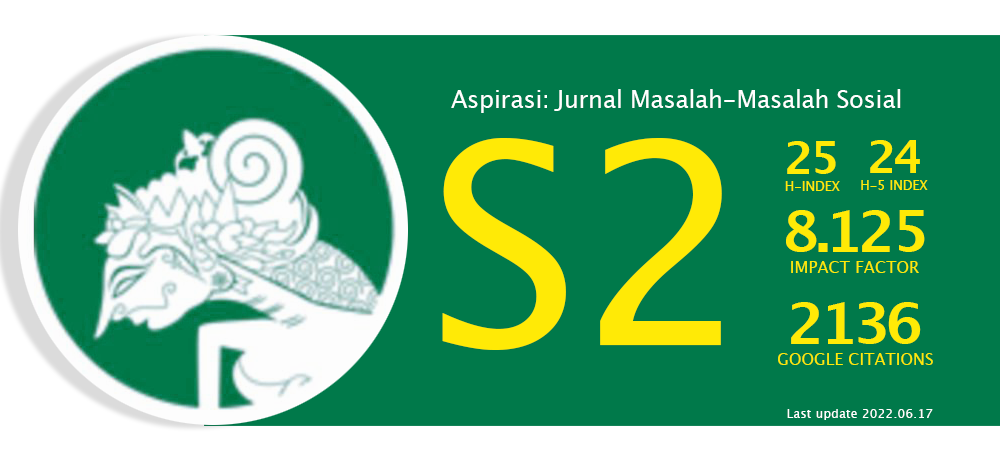PANCASILA DAN PERUBAHAN SOSIAL: PERSPEKTIF INDIVIDU DAN STRUKTUR DALAM DINAMIKA INTERAKSI SOSIAL
Abstract
Keywords
Full Text:
UntitledReferences
Ancok, Djamaludin. 2003. Modal Sosial dan Kualitas Masyarakat, Pidato Pengukuhan Jabatan guru Besar Universitas Gadjah Mada, Yogyakarta, 3 Mei 2003.
Bourdieu, Pierre, and Loic Wacquant. 1992. An Invitation to Reflexive Sociology. Chicago: The University of Chicago Press.
Bourdieu, Pierre. 1977. Outline of a Theory of Practice. Cambridge: Cambridge University Press.
Burns. Tom R. (et.all). 1987. Man, Decisions, Society. Swiss: Gordon and Breach Science Publisher.
Coleman, James S. 1990. Foundations of Social Theory. Cambridge, MA and London: Harvard University Press.
Coleman, James S. 1994. “Social Capital, Human Capital, and Investment in Youth,” in Anne C. Peterson and Jeylan T. Mortimer, eds. Youth Unemployment and Society. New York: Cambridge University Press.
Etzioni, Amitai. 1986. Organisasi-Organisasi Modern. Jakarta: Press Universitas Indonesia.
Fukuyama, F. 1995. Trust: The Social Values and the Creation of Prosperity. New York: Free Press.
Fukuyama, F., L. Omer and N. Hirst. 1997. Social Capital: The Great Disruptio.,The 1997 Tanner Lectures. Oxford: Brasenose College.
Giddens, Anthony. 1995. The Constitution of Society: Otline of the Theory of Structuration. Berkeley: University of California Press.
Giddens, Anthony. 1995. The Constitution of Society: Teori Strukturasi untuk Analisis Sosial, a.b., Adi Loka Sujono. Pasuruan: Pedati
Granovetter, Mark S. 1985, “Economic Action, Social Structure and Embeddedness.” American Journal of Sociology. 91:481-510.
Habermas, Jurgen. 1989. The Condition of Postmodernity. Cambridge MA: Basil Blackwell.
Herry-Priyono. 2003. Anthony Giddens, Suatu Pengantar. cet-. Jakarta: 2KPG.
Horton, Paul B Dan Chester L. Hunt. 1984. Sociology. Jakarta: Penerbit Erlangga.
Prayitno, Ujianto Singgih. 2013. Kontekstualisasi Kearifan Lokal dalam Pemberdayaan Masyarakat. Jakarta: P3DI Setjen DPR RI dan Azza Grafika.
Prayitno, Ujianto Singgih. 2014. Perubahan Sosial Dinamika Perkembangan Ilmu Pengetahuan dan Teknologi dalam Kehidupan Masyarakat. Jakarta: P3DI Setjen DPR RI dan Publica Press.
Ritzer and Goodman.2004. Teori Sosiologi Modern, a.b. Alimandan. Jakarta:Prenada Media.
Ritzer, George. 1996. Sociological Theory.New York: The McGraw-Hill Companies, Inc.
Suparlan, Parsudi. 2008. Dari Masyarakat Majemuk menuju masyarakat Multikultural, Jakarta: Yayasan Pengembangan Kajian Ilmu Kepolisian.
Veeger, KJ. 1985. Realitas Sosial, Refleksi Filsafat Sosial atas Hubungan Individu–Masyarakat dalam Cakrawala Sejarah Sosiologi. Jakarta: Gramedia Pustaka Utama.
Wallace, R.A and Wolf, A. 1999. Contemporary Sociological Theory: Expanding the Classical Tradition. Fifth Edition. New Jersey: Prentice Hall.
Wirutomo, Paulus (et.all). 2012. Sistem Sosial Indonesia. Jakarta: UI-Press.
DOI: https://doi.org/10.46807/aspirasi.v5i2.460
Refbacks
- There are currently no refbacks.







